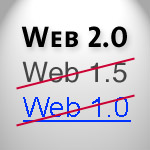 Web 1.0, built in the 1990s, is characterized as static web pages that were built and marketed by web professionals. Sites were found by typing in a domain name and hoping that a particular company had a site (hence the rise of domains such as pets.com).
Web 1.0, built in the 1990s, is characterized as static web pages that were built and marketed by web professionals. Sites were found by typing in a domain name and hoping that a particular company had a site (hence the rise of domains such as pets.com).
Web 1.5, created around 2000, brought dynamic sites and ecommerce into the fold. Marketing campaigns are pushed via email and banner advertising.
Web 2.0, building in 2006, offers a place where customers are treated like adults and are valued for their opinions and views and are talked to in a human voice.
To further define the differences, the tables below summarizes the techniques and technologies that surround the Web 2.0 concept.
Web Marketing Techniques
| Web 1.0 | Web 2.0 |
| Static HTML | Blog Publishing |
| Design Aesthetics | Design Simplicity |
| Page Hits | RSS Subscribers |
| Site Designed By Web Pros | Site Shaped Democratically by Multiple Authors |
| Email Marketing | RSS Feeds |
| Personal Web Sites | Personal Blogs |
| Domain Names to Find Sites | Search Engine Optimization |
| Page Views | Cost-per-click |
| Content Management Solutions | Wikis |
| Stickiness | Syndication |
| Taxonomy / Directories | Folksonomy |
| HTML code | SQL calls |
| Software with releases | Infoware in perpetual beta |
| Proprietary software | Open Source software |
Companies
| Web 1.0 | Web 2.0 |
| DoubleClick | Google Adsense |
| Ofoto | Flickr |
| Akamai | BitTorrent |
| mp3.com | iTunes |
| Britannica Online | Wikipedia |
| MapQuest | Google Maps |
| Netscape | |
| Microsoft Word | Writely |
